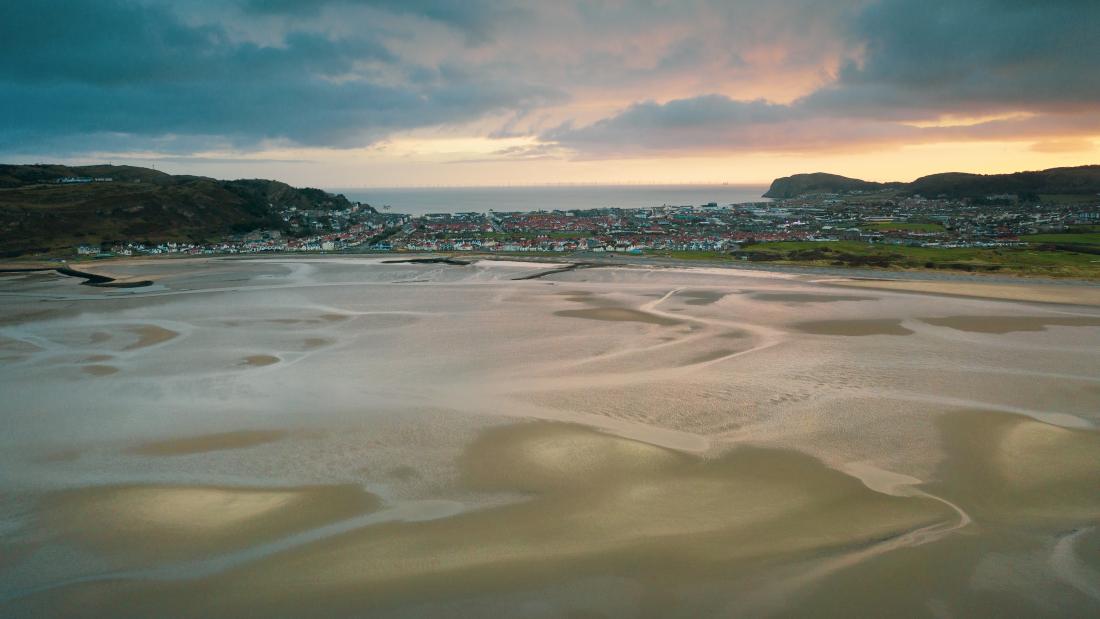Bangor University research informs RNLI safety warning as study reveals 15% of UK population reported having experienced tidal cut off
With high tides peaking over the Easter Bank Holiday, when more people are expected to visit the Welsh coast, the RNLI has teamed up with Bangor University to reveal the results of a new study.
The nationwide study has revealed the shocking statistic that up to 10 million people in the UK may have had some experience of being cut off by an incoming tide when visiting the coast. An incoming tide can quickly leave people stranded, often requiring the RNLI’s help. On bigger tides like we will see over the Easter period, places will be cut off by the tide quicker than normal and places usually unaffected by the tide may also be cut off.
Spring tides will build over the Easter weekend and peak on Saturday 9 April. The lifesaving charity is urging people to use a trusted online source such as magicseaweed.com or a tidal prediction app before setting off on a trip. Coastal visitors should be aware the water may change quickly and very differently to what may be expected.
RNLI statistics for Wales show people getting cut off by the tide caused almost 10% of all lifeboat launches over the last decade – more than double the UK average.
The RNLI teamed up with Bangor University last year as part of a project to understand people’s knowledge of the tide. Researchers have been talking to people who have experienced tidal cut offs to explore some of the reasons why they get into trouble. The charity is calling on people to be extra careful if visiting the coast over the Easter weekend in light of the statistic that 15% of the UK population reported having experienced tidal cut off.
The survey also found:
· Over half (57%) of those who had experienced tidal cut off lived inland – away from the coast.
· A staggering 38% of the British population were unaware that the tide typically comes in twice a day
· 40% were not aware that the rises and falls of the tide are not the same every day
· Over a third of people were not aware that tides vary across locations
The university commissioned a marine social scientist to unpick people’s awareness of tides, with a view to improving tidal knowledge through new public campaigns and education. With the support of an Oceanographer and a Professor of Linguistics, the University are committed to helping to ensure people enjoy our coastline safely, and the charity to ultimately save more lives.
Dr Liz Morris-Webb, Researcher and Marine Social Scientist at Bangor University said:
‘The results of our initial survey show just how much the public misunderstand the tide, but also how even those with experience and knowledge of the coast can easily get into trouble if underprepared or distracted. Many respondents who reported being cut off by the tide wanted to send a message to others, especially how quickly the tide can change and become very dangerous. Interviews with those involved with RNLI rescues have described how the tide near a cliff ‘fills like a bath’; how on a sandflat, ‘the sea can come in faster than you can run’ and how the tide can be very different just around the corner.’
Always check the weather and tides
Chris Cousens, RNLI Water Safety Lead for Wales said the survey would help the RNLI shape it’s safety messaging to ensure it is having an effect.
He said,
‘Our core message of always check the weather and tides is a complex one as we suspect there is confusion over where to access tidal information, and not knowing how to interpret the beach specific tidal information. It’s been extremely useful to work with experts at Bangor University and we look forward to the next step in this exciting collaboration. ‘We expect this weekend to be busy on the coast, but with higher than normal spring tides forecast this weekend, areas affected by tidal cut off may be cut off faster than normal, and other areas not normally known for tidal cut off may see incidents in the coming days. Anyone heading to the coast is reminded of the importance of checking the tide times and ensuring they have enough time to return if they decide to venture further along the beach. ‘It’s hard to imagine how walking can turn out to be such a dangerous activity, this is why it’s important to always check the tide times at the start of your day, keep an eye out for the incoming tide and leave enough time to return safely. It’s also vital to always carry a means of calling for help. If in doubt seek local advice.’
Thora Tenbrink, Professor of Linguistics at Bangor University said,
“When starting this study we knew that tidal cut-off is a concern – but these results demonstrate just how bad it is. So many people have experienced it in some way or other, and we can see from the responses that it’s not always just being distracted. It’s also a lack of awareness of some fundamental principles such as how quick the tide can be, how different it is at different places, and how much it changes every day. Understanding people’s thoughts and unspoken assumptions is very important; it enables us to design clear and simple messages that fill the gaps in people’s awareness.”
Dr Martin Austin, Senior Lecturer in Ocean Sciences at Bangor University added,
“From a simple physical perspective, tides can be viewed as the periodic increase and decrease in the level of the water at the coast – many people know this basic fact. However, they are frequently unaware that the times and heights of the tide change on daily and weekly timescales and are different for every location around the coastline. Beaches and coasts are also highly changeable landscapes due to natural processes, therefore the path the tides takes flooding a beach one week may be very different the following week. Combining these physical factors can make our beaches and coastline a hazardous environment for the unwary.”




